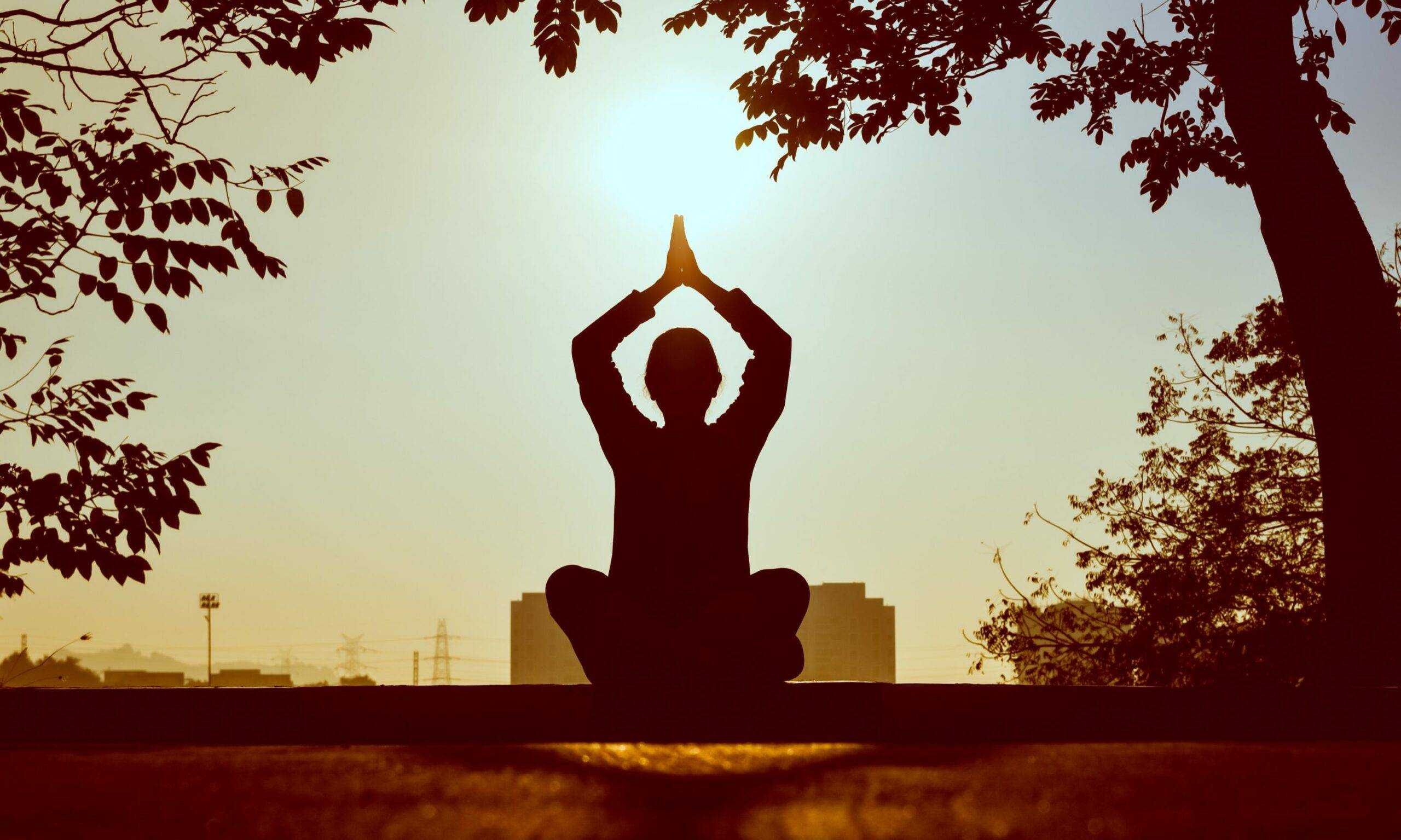With increasing anxiety and stress levels among all age groups, there is a rising need for physical and emotional support for every individual. Meditation is considered as one of the anxiety controlling methods that helps soothe the mind and body. Meditation is a practice of focused concentration that helps one come back to the present moment. Thus, meditation improves your emotional well-being as it gives you peace, calm and a balanced mind. Meditation not only helps reduce anxiety, but also improves overall mental well-being.
Reducing Anxiety, Stress and Depression with Meditation
Meditation is a technique where an individual focuses their attention or concentration on a particular thought, object or activity. Many methods of meditation have their roots in Buddhist philosophy. Meditation has also proven to reduce chronic pain, depression, high blood pressure and heart disease.
How Meditation Reduces Anxiety
Anxiety is a common emotion that people may experience while dealing with stress and problems in regular life. Meditation helps reduce fatigue and stress, thus helping those suffering from anxiety. But persistent stress and anxiety affects the ability to do productive work. If not dealt with properly, it doesn’t take a lot of time for regular anxiety attacks to turn into anxiety disorder. Simple exercise and meditation for anxiety can prove to be effective for one’s emotional and mental well-being.
Our Wellness Programs
How Meditation Helps with Depression
Depression is another major health issue for most people dealing with life’s daily problems. Stress and anxiety act as a trigger for depression. Meditation prepares the brain for stressful situations and blocks negative thoughts from entering the mind. During meditation, we clear all the overloaded information in our mind that leads to stress and anxiety. Meditation helps eliminate the thoughts that cause stress to the body and brings focus to the mind. Mindfulness meditation, in particular, has proven to reduce anxiety, stress and other mental health issues.
Looking for services related to this subject? Get in touch with these experts today!!
Experts

Kirti Bajpai

India
Psychologist
Experience: 5 years

Mansi Chawla

India
Psychologist
Experience: 12 years

Sapna Zarwal

India
Psychologist
Experience: 19 years

Davis Emerson

India
Psychologist
Experience: 6 years
How Meditation Helps Reduce Anxiety
Meditation is a habit that you adopt gradually, and it involves training your mind to focus on your thoughts. Additionally, meditation helps you observe your surroundings better. If you live with anxiety on a daily basis, then meditation is the best way to help you bring a feeling of calmness and peace. Practicing meditation daily helps you in overcoming anxiety and reducing tension in your body.
Many consider meditation a complementary medicine for the mind and body. It helps eliminate negative thoughts that take up a large space of the mind, leading to stress and anxiety. Also, the effect of meditation does not end after your session ends. Meditation sessions help us carry a positive and fresh attitude throughout the day. It also helps us manage other medical conditions, reducing worry and increasing general awareness.
Benefits of Meditation for Reducing Anxiety
Spending a few minutes of the day meditating can help one gain inner peace and happiness. Some of the benefits of anxiety meditationare:
1. Reduces negative emotions
2. Reduces the effects of anxiety
3. Helps build the skills required for managing stress
4. Increases self-awareness
5. Increases imagination and creativity
6. Increases patience and tolerance
Mental Illnesses Treated by Meditation
Meditation also plays an important role when one has a medical condition that has worsened due to stress. The list of mental Illnesses that can be managed with the help of meditation are:
1. Anxiety
2. Stress
3. High Blood Pressure
4. Headache
5. Sleep Problems
6. Chronic Pain
7. Depression
9. Asthma
10. Cancer
11. Heart Disease
12. Irritable Bowel Syndrome
Although meditation is not a replacement for regular medication or counseling, it can surely help speed up treatment and recovery.
Best Meditations for Anxiety Relief
There are various anxiety meditations that can help you cope with stress, anxiety and depression. Some of the best meditations for anxiety relief are:
1. Focused Attention Meditation
Focus is one of the most important elements of meditation. It helps free your mind from unwanted thoughts, distractions and worries, which lead to stress and anxiety. This is a straightforward form of meditation as it uses breath to focus attention, maintain awareness and anchor the mind. You should definitely give this a try. If you notice your mind is wandering just bring it back to your breath. Additionally, you can also focus on a specific object in your mind, an image or mantra of your choice.
2. Relaxed Breathing Meditation
This is a relaxed breathing technique which involves even-paced, slow and deep breathing with the use of diaphragm muscles to enlarge the lungs. The purpose of relaxed breathing is to take in more oxygen and exhale carbon dioxide during the breathing process. Relaxed breathing also reduces the pressure on your neck, shoulder and upper chest muscles to breathe more efficiently. Ample oxygen levels in the body rejuvenates it and brings in positive thoughts and energy.
Tips for Meditating During Anxiety
The majority of us run around pillar to post completing daily activities, one after another and are busy fulfilling the demands and needs of different parts of life. And while trying to meet the demand for these daily activities, we end up feeling anxious and stressed and do not take the time to slow down and enjoy the present moment. Thus, meditation plays an important role in reducing this anxiety as it teaches us to feel, enjoy and cherish the moment. However, it is not that easy to change your thought processing pattern. It is a habit that has to be developed, and regular meditation will help you achieve this.
Here are some tips that can help you meditate during anxiety:
1. Choose a Quiet Setting
If you are a beginner in meditation, then you can choose a quiet place or a spot with very few distractions caused by radios, cellphones, televisions and other such sources. A quiet setting would help learn the technique of concentration and master it with regular practice. Once you master the skill, you can meditate anywhere, especially during stressful situations such as during work, traffic jams or while waiting in a long queue at a grocery store.
2. Choose a Comfortable Position
While meditating, a comfortable position is a must. You can choose to meditate while lying down on the floor or bed, sitting in an office or at home, walking in the park, or in any other position in which you are comfortable. Meditation can also be performed while doing any activity that you enjoy, such as cooking or cleaning. The only important element is your comfort to get the maximum benefit from your meditation session. Also, you should maintain good posture at the time of meditation.
3. Have an Open Attitude
You should always keep an open mind to accept and learn more about your thoughts, feelings and emotions. Meditation would help you to keep those thoughts flowing and not hamper your emotions or mental well-being. Meditation would help you learn to let the thoughts pass your mind without any judgment. Also, you should stop over-thinking about any activity or situation and approach it with an open mind and attitude.
4. Meditate in the Morning
Morning is a great time for concentration as it is the start of the day and everything in and around you is calm and quiet. It would help if you took some time out for yourself and your mind from your daily routine before starting your day. Meditating for some time in the morning helps start the day with the right frame of mind and channel positive thoughts and feelings.
5. Spend Some Time Outside
Whenever possible, you should go outside and practice meditating outdoors. This would help you get some fresh air and take a break from the closed confines of your house where you stay for the maximum amount of time. Spending time outside would also help you to observe the natural beauty around you. While walking, you can observe the trees, smell the fragrance of the flowers and be in touch with nature. These activities make your mind fresher and also help focus more on the art of meditation itself.
6. Concentrate on One Task at a Time
Each time you have to perform multiple tasks, it is absolutely fine to perform one task at a time. By dividing your time for multiple tasks, the most important point is you are not giving proper attention to each task, which leads to an increase in your stress levels. Thus, to avoid anxiety attacks, you must first work to focus on one task and finish it. Once it is completed, you can focus on completing the other tasks.
7. Feel Your Emotions
You should not avoid your feelings or emotions. To cope with anxiety, you should be in a state to accept all types of feelings and emotions. These can be anger, sadness, jealousy or disappointment, among others. Thus, if you wish to enjoy the present moment, you should learn to master the art of anxiety meditationas it will help you find more happiness and strength in the feelings you express and emotions you feel.
Anxiety Counseling for Anxiety Disorder
As anxiety can result in nervousness, self-doubt and worry, it can turn into a mental health disorder if not dealt with. Everyone has to deal with anxiety at some point in time in their life. Anxiety has four kinds of impacts on a person: physical impact, emotional impact, cognitive impact and behavioral impact. There is no harm in asking for help if you are going through a bad patch. Hiding your problems and not seeking help can lead to bigger problems. You can share your thoughts with your loved ones, or choose amongst various online platforms can help you deal with the situation. United We Care specializes in anxiety counseling with certified counselors who can help you deal with anxiety and live a more fulfilling, happier life.
Guided Meditation for Anxiety
You could also try meditation. Instead of searching for a youtube meditation for anxiety, you should try our guided meditation for reducing stress and anxiety. Mindfulness meditation and various other exercises can help you to manage the symptoms of anxiety. Additionally, meditation would also help you gain clarity with respect to your surroundings, which can help you recognize what triggers your anxiety and how to deal with it effectively.



 Conflict Management in Relationships
Conflict Management in Relationships

 Healing from Heartbreak
Healing from Heartbreak
 Coping With Anxiety
Coping With Anxiety
 Get Started With Mindfulness
Get Started With Mindfulness








